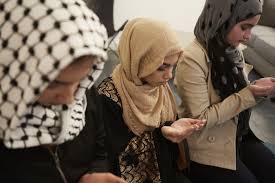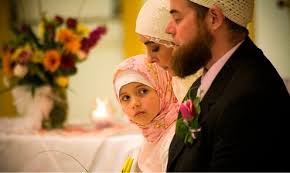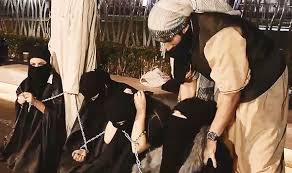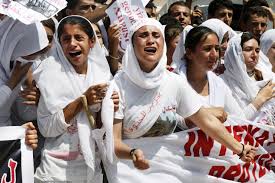Hedegaard's miserable girls


April 25, 2011 - Review - by Hege Storhaug
Lars Hedegaard has written an in-depth, intelligent, well-documented and decent defense, believes information manager of the Human Right Service in Norway, Hege Storhaug. Read her review of "Muhammad's girls", which is published the same day Lars Hedegaard once again went to court, accused of his statements on the subject.
Empathy with Muslim girls

There is good reason to feel very offended when you read Lars Hedegaard's smoking fresh book Muhammad's girls. Violence, murder and rape in the house of Islam.
However, if you have empathy with your fellow human beings, and if you also include Muslim girls and women as their fellow human beings. At least Hedegaard does.
To the full, he documents what misery so many Muslim girls and women live in, now also in our neighboring apartments here in the West.
The prosecution is, to put it mildly, a major challenge to explain to the Danish citizens how Islam's brutality towards "Muhammad's girls" can be discussed when Hedegaard today meets for the court.
20 years knowledge of the case
I find that I should immediately make the reader aware that I have studied Muslim girls and women's living conditions up close both here in Norway, in Europe and in Pakistan for almost 20 years.
As a journalist in the field, as a writer, and now as information manager in Human Rights Service, a political think tank with a special focus on repression of Muslim girls and women. I have waded into misery.
I have met girls who have later been honored, I have met girls who have been blinded and watered after acid attack, I have been raising young women rowing in fire departments in Lahore and Islamabad, girls who know they only have hours or days left to live after husband and in-laws have set fire to them.
I have met Norwegian-born girls who have gotten their genitals mutilated in the jungle in their parents' homeland, where they are today held in captivity.
I have met Norwegian-born girls who have become so extremely raped after forced marriage as children that they will never be able to function normally again.
As Norwegian-born Jeanette so eloquently described her experience when her parents married her as a 16-year-old to a man who was twice as old as her: "They did not arrange my marriage. They arranged my rape. ”
Intelligent and decent defense

That way I could still side up and down. Despite this broad background, Hedegaard's book caught me. He has performed a profound, intelligent, well-documented and decent defense - but that doesn't matter to the prosecution.
The prosecution is, as is known, not concerned with facts but of emotions, but not of Muslim girls and women's feelings, but of their rulers' feelings - an unknown but high number of Muslim men.
Then one might ask: who violates who? Is ignorance of suffering considered an offense? Or is it pointing out grotesque facts a worse (and punishable) so-called infringement?
Slavery legitimized by Muhammad
Perhaps the prosecution does not know especially about Islam, such as Islam allowing slavery, a slavery staged and legalized by Islamist Muhammad: "Slaves are slaves because Allah has created them to be.
The same applies to female sex slaves (p. 19). ”We who have taken the trouble to familiarize ourselves with the basic element of Islam are thus well acquainted with the verses of the Qur'an, not least explaining how Muslim men should relate to their slaves, male as female.
Therefore, when one reads about the mass slaughter of the Jewish tribe Banu Qurayza, which culminates in Muhammad picking out the most gorgeous war booty, "the beautiful Jewish Rayhana", which is just after raising the massacre of the husband and male family members to Muhammad's tent, one nods. as a sex slave.
Thus, a normative and commendable act today, as Hedegaard notes: "… anywhere Muslim men are, and where there are unbelieving women, one can overcome" (p. 31).
(Should I / Hedegaard, in view of the prosecution's long and voracious arm add that not all Muslim men today would think that such actions should be copied, but that theologically this is sanctioned and deified?)
Variation

Hedegaard devotes wide attention to slavery, and the sources are many. Here, however, there is a need for a nuance when Hedegaard points to the slave markets in Pakistani Punjab after the division of the subcontinent in 1947, where the Sikh and Hindu women were sold to Muslim men.
The bloody division of the subcontinent hit all religious groups, like my girlfriend in Islamabad's two married aunts. They were captured by Sikhs during the flight from India to the new country of Pakistan. They were forcibly converted and forced into the Sikhs.
But: neither Sikhs, Hindus, Buddhists, nor Christians have an alleged prophet to lean on to legitimize such action against women. Not least this is what makes Islam so desperate. Saying with Ayaan Hirsi Ali's words:
This obsession with subordinating women is what makes Islam so simple. And Islam's agents - from Riyadh to Tehran, from Islamabad to Cairo - know that any improvement of women's lives will lead to the demise of Islam and their loss of power.
This is why they are so desperate to cage in the women. This is also why they hate the West. (...).
If we do not understand the difference between Islam and the West - why one is so amazing and the other so low - and we do not fight back and win this idea battle to preserve our civilization, then from my point of view there is no point in either yours or mine profession ”(lecture titled The Role of Journalism Today, at the National Press Club in Washington DC, June 18, 2007).
In many ways, it is almost impossible to take control of Islam's power and hence destruction. As "Islam (has) put any other violence regime known to history, in the shadow - including the modern genocide regimes: Nazism and Communism" (p.27).
Critical reason is affected by Islam

Where Islam's armies marched, high cultures were razed and the women were parked on the sidelines of society. No wonder Hedegaard is concerned about Europe's future with today's emergence of Islam.
Not least because critical reason and humanism are the hardest victims of Islam, hence those who are most vulnerable in the extreme hierarchical systems: the girls and the women.
Reading the many documented fates of Islam, whether it's about murder, rape or group rape - both here in the West and in the Muslim world - is brutal and so disgusting that I can't bear to go into detail here.
The intellectual betrayal
However, I would note that when Hedegaard points to the intellectual and political betrayal committed by, for example, blaming poverty as the cause of the grotesque women's reality, he is so right. Let me give one example:
In 1999, two-year-old mother Samia Sarwar was executed in Lahore at the renowned lawyer Hina Jilani's office.
Samia wanted to get out of a violent marriage with her cousin, and she had fallen in love with another. Sami's father is a leading businessman in Peshawar, and his mother is a doctor, as are two sisters of Samia.
It was just the mother who allowed the murder by persuading Samia to meet her at Samia's lawyer.
The mother enticed Samia that the family accepted both divorce and new marriage. With him in the meeting, her mother had the killer by her side who shot her to death there and then.
I participated in a documentary on Norwegian television about, among other things, this honor killings that year, and after the film was shown, a film that shocked Norway, said then peak in the Socialist Left Party, now Minister of Environment and Development, Erik Solheim - on autopilot - that "poverty "Was the basis of such honor killings. Case closed.
Islam leads to sick woman's eyesight

On the contrary, one can establish, as Hedegaard does, that it is Islam and this culture of honor that leads to poverty due to the sick woman's vision.
"Muslims can change, Islam cannot" (p. 65), says Hedegaard. If Islam is to change, for Sunni Islam, it will require al-Ahzar University of Cairo to reject crystal clear that the Qur'an should be the word of God, but should be considered "a kind of" conversation associated with a particular time, and therefore could not be binding on our ”.
For the Shia Islam, the same applies: "... it (must) involve a similar clear mark from the top Ayatollaher in Iran's theological headquarters in Qum."
Furthermore, OIC had to withdraw the fascist and anti-human rights Cairo Declaration of 1990, where the entire UN Declaration of Human Rights is subject to barbaric sharia.
The taboo theme: Family rape

So Hedegaard manages to prove his statements in his own home that Muslim men "rape their own children. You hear it all the time. Girls in Muslim families are raped by their uncles, their cousins or their father ”?
I mean yes, as far as it is possible to approve such a taboo and sub-communicated topic. He uses a number of international sources and voices based on the fact that the statement is not unacceptable, although it could have been more nuanced.
Hedegaard especially has a good point when he points out this questioning: hardly anything is guarded stricter than Muslim girls do. This results in so many being imprisoned within the family.
Why is it so widespread with muddy tests before marriage, in the Muslim world and now also in the West, and why do so many need to sew in a new mummy? The most obvious thing is that the motherhood is taken by a close male family member, or?
In addition, when you are forcing your daughter (who is extremely widespread), and knowing that she is religiously obliged to obey sexually, and that there is nothing called rape in marriage, yes, then a family father (and -mor) is involved rape of their own child.
Sorry Jeanette mentioned here: she begged her parents for help to escape the massive rapes, but they turned their backs on her.
Pathological obsession
Islam's pathological obsession with girls and women's body and sexuality is undoubtedly one of the worst scours of our time. Even darker it becomes when Hedegaard proves that the conditions have deteriorated over the years.
This is where I have a point of appeal against the book: for how did the women have on the Arabian Peninsula before Islam? The most interesting source that can answer this question, as I know, is Fatima Mernissi's book Beyond the Veil, Male-Female Dynamics in the Mother Muslim Society.
Mernissi source coder that when Muhammad started his mission among the tribes of the Arabian Peninsula in the 6th century, the women had a high degree of discretion over their own sexuality.
She did not belong to a husband, she and the children were part of the tribal community.
The woman could even relate to several men at the same time (!), She could distinguish herself as she wanted, and for example she could decide for herself who she was supposed to be the father of her child.
The children belonged to the woman and the tribe, while the man came and went with commercial caravans. It was thus impossible for him to exercise control over his wife in daily life.
The tribe's honor and prestige were therefore not linked to women's sexuality.
At this time, Muhammad came up with his new project: the family as a system. The family as a substitute for the tribe. Muhammad was particularly keen to put women's sexuality under control.
With control of the woman's body, he saw the possibility that the Arab men would accept the family as the new social entity. Through the family, the man could realize an independent financial career, not just being part of an economic tribal community.
For the man it was therefore crucial to make sure that his wife's children were his carnal offspring, children who would one day inherit him. The key question was therefore: How to regulate paternity?
One moment, Islam's clear ban on sex outside of marriage. The other was that the woman after divorce or at the time of her husband's death had to wait for a period of four months and ten days, so-called idda, before she could remarry.
How to clarify whether she is pregnant and thus who is the father of the fetus. With the family as a system, women's sexual and marital freedom disappeared out the back door.
Thus, we can observe that the women were far freer before Muhammad, as his first wife Khadija, who was a leading business woman and widow who liberated Muhammad - before the angel Gabriel should have whispered the first words in the ear. Is there such a woman in today's Mecca?
It offends me - and Hedegaard
A saying in Pakistan reads like this: "A man is like a horse. No matter how dirty he gets, he can always be washed clean again. While a woman, she can never be washed clean. "
My conclusion after reading Hedegaard's statement about Muhammad's girls is that before the trial is resumed today he has already managed to clean himself. Not because he is like a horse, but because a knowledgeable man has done a thorough piece of work.
But facts and critical reason are probably no more common coins in New Denmark. This is how to cement Muslim girls and women's opportunities to release massive daily offenses.
It offends me - and Hedegaard.
Hege Storhaug is presenting a presentation at the Press Freedom Society's conference on May 8th
DEN FORBUDTE SANDHET - Previous book by Hedegaard
Defending Lars Hedegaard: "A STEW OF ANTI-MUSLIM BILE AND CONSPIRACY-LADEN FORECASTS"
Daniel Pipes Front Page Magazine, March 6, 2013
At 11:20 a.m. on Feb. 5, Lars Hedegaard answered his door bell to an apparent mailman. Instead of receiving a package, however, the 70-year-old Danish historian and journalist found himself face to face with a would-be assassin about one third his age. The assailant shot him once, narrowly missing his head. The gun locked, Hedegaard wrestled with him, and the young man fled. Given Hedegaard's criticism of Islam and his even being taken to court on criminal charges of "hate speech," the attack reverberated in Denmark and beyond.
The Associated Press reported this incident, which was featured prominently in the British press, including the Guardian, the Daily Mail, and the Spectator, as well as in Canada's National Post. The Wall Street Journal published an article by him about his experience. When the New York Times belatedly bestirred itself on Feb. 28 to inform its readership about the assassination attempt, it did not so much report the event itself but an alleged Muslim support for Hedegaard to express himself.
As implied by the title of Andrew Higgins' article, "Danish Opponent of Islam Is Attacked, and Muslims Defend His Right to Speak," he mainly celebrates Danish Islam: "Muslim groups in the country, which were often criticized during the cartoon furor for not speaking out against violence and even deliberately fanning the flames, raised their voices to condemn the attack on Mr. Hedegaard and support his right to express his views, no matter how odious [emphasis added]."
This theme pervades the piece; for example, Karen Haekkerup, the minister of social affairs and integration, is quoted pleased that "the Muslim community is now active in the debate." Secondarily Higgins delegitimizes Hedegaard, my topic here. In addition to the snarky "no matter how odious" reference, Higgins dismisses Hedegaard's "opinions" as "a stew of antiMuslim bile and conspiracy-laden forecasts of a coming civil war" and claims the Dane has "fanned wild conspiracy theories and sometimes veered into calumny." These characterizations of Hedegaard's work are a vicious travesty.
A few specifics: 1. What Higgins airily dismisses as Hedegaard's "opinions" is in fact a substantial oeuvre in several academic books and articles laden with facts and references dealing with Islamic ideology, Muslim history, and Muslim immigration to Denmark. Those books include: I krigens hus: Islams kolonisering af Vesten [In the House of War: Islam's colonization of the
Isranet-publications Isranet Daily Briefing, March 8, 2013
| 5 West] (with Helle Merete Brix and Torben Hansen). Aarhus, Hovedland, 2003 1400 års krigen: Islams strategi, EU og frihedens endeligt [The 1400 Year War: Islam's strategy, the EU and the demise of freedom] (with Mogens Camre). Odense, Trykkefrihedsselskabets Bibliotek, 2009 Muhammeds piger: Vold, mord og voldtægter i Islams Hus. [Muhammad's girls: Violence, murder and rape in the House of Islam] Odense, Trykkefrihedsselskabets Bibliotek, 2011 Hedegaard's major articles include: "Den 11. september som historie" [September 11 as history] in Helle Merete Brix and Torben Hansen (eds.), Islam i Vesten: På Koranens vej?
Copenhagen, Tiderne Skifter, 2002. "The Growth of Islam in Denmark and the Future of Secularism" in Kurt Almqvist (ed.), The Secular State and Islam in Europe. Stockholm, Axel and Margaret Ax:son Johnson Foundation, 2007 "Free Speech: Its Benefits and Limitations" in Süheyla Kirca and LuEtt Hanson (eds.), Freedom and Prejudice: Approaches to Media and Culture. Istanbul, Bahcesehir University Press, 2008 "De cartoon-jihad en de opkomst van parallelle samenlevingen" [The cartoon jihad and the emergence of parallel societies] in Hans Jansen and Bert Snel (eds.), Eindstrijd: De finale clash tussen het liberale Westen en een traditionele islam. Amsterdam, Uitgiverij Van Praag, 2009
To the best of my knowledge, no one has claimed these writings contain sloppy scholarship or wrong references. As Hedegaard puts it, "I am a university-trained historian and take my craft seriously." The real criticism of Hedegaard is not about his scholarship – but that he raises difficult and even unpleasant questions. And, as someone who has written two books on conspiracy theories, I judge Hedegaard's writings innocent of that intellectual sin.
2. Higgins ascribes to him "forecasts of a coming war"; but these are not his forecasts, only his reporting what Islamist texts and spokesmen themselves predict and advocate.
3. Higgins writes that Hedegaard "for several years edited a mainstream Danish daily, Information, is a major figure in what a study last year by a British group, Hope Not Hate, identified as a global movement of 'Islamophobic' writers, bloggers and activists whose 'antiMuslim rhetoric poisons the political discourse, sometimes with deadly effect'." "Islamophobia" is a silly neologism intended to vilify anyone who criticizes Islam or even isranet-publications Isranet Daily Briefing, March 8, 2013 https://www.isranet.org/daily-briefing/islamization-europe-pro ceeds-extent-holocaust-enlarged-while-media-ignoredenmark-attack-vienna-bar/
6 Islamism. As for "sometimes with deadly effect": that is applied to the whole group of 100 organizations and individuals in the Hate not Hope listing, not to Hedegaard individually. Higgins nastily insinuates that Hedegaard is responsible for deadly attacks on Muslims when, in fact, he was the victim not the perpetrator of an attack. (Hope not Hate, by the way, lists both the Middle East Forum and me in its Counter-Jihad Report; it flatters me as the "Powerhouse behind the international counter-jihadist movement.")
In conclusion, it's not "a stew of anti-Muslim bile and conspiracy-laden forecasts" but "a cocktail of sensible critiques and unsettling analyses." Higgins has written a stew of shoddy aspersions of a brave, distinguished, and accomplished writer with whom I co-authored an article "Something Rotten in Denmark?" in 2002 and who is currently a colleague at the Middle East Forum.
One Godless Woman - Published on May 2, 2019
WHO and WHAT is behind it all ? : >
The bottom line is for the people to regain their original, moral principles, which have intentionally been watered out over the past generations by our press, TV, and other media owned by the Illuminati/Bilderberger Group, corrupting our morals by making misbehavior acceptable to our society. Only in this way shall we conquer this oncoming wave of evil.
Commentary:
Administrator
HUMAN SYNTHESIS
All articles contained in Human-Synthesis are freely available and collected from the Internet. The interpretation of the contents is left to the readers and do not necessarily represent the views of the Administrator. Disclaimer: The contents of this article are of sole responsibility of the author(s). Human-Synthesis will not be responsible for any inaccurate or incorrect statement in this article. Human-Synthesis grants permission to cross-post original Human-Synthesis articles on community internet sites as long as the text & title are not modified.
The source and the author's copyright must be displayed. For publication of Human-Synthesis articles in print or other forms including commercial internet sites. Human-Synthesis contains copyrighted material the use of which has not always been specifically authorized by the copyright owner. We are making such material available to our readers under the provisions of "fair use" in an effort to advance a better understanding of political, economic and social issues. The material on this site is distributed without profit to those who have expressed a prior interest in receiving it for research and educational purposes. If you wish to use copyrighted material for purposes other than "fair use" you must request permission from the copyright owner.
TILBAKE TIL HOVEDMENYEN - BACK TO THE MAIN MENU